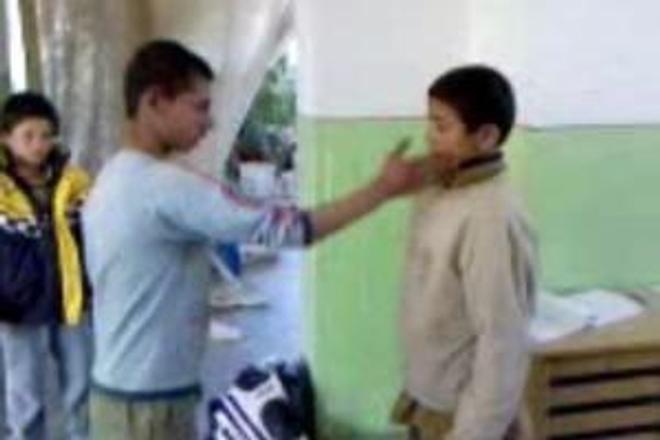“The senate of The Košice II District Court decided about acquittal of accused [persons]on February 27 ... because it wasn’t proved that act they were accused for really happened,” Košice Regional Court spokeswoman Marcela Gálová told The Slovak Spectator, adding that prosecutor Rastislav Remeta immediately appealed against the verdict.
The case has captured the attention of media and the public due to a video, in which police officers at Košice-South station humiliated the boys who robbed an elderly lady on that day and shoved her to the ground, leaving her injured. Police officers were subsequently forcing them to strip naked, set a police dog against them or force them to slap each other.
“Give him a good one! And now you, hit him back! Now kiss each other,” says the hidden cameraman. “Hit him and shut up. I’ll tell you when to stop. If he ducks, I’ll kick him.”
The court refused the video claiming that it was made unlawfully as its origin was not proven and it is not clear who made it.
According to legislation, the court can consider as proof everything which can shed light on the case however it has to be made in lawful way. It is on the court to decide whether this condition was fulfilled or not, according to lawyer Jozef Dobrovič from Almáši Gabriel law firm.
“From the laic point of view is this decision surely unacceptable but considering the current legislation and accustomed practice of courts the [Košice] court is able to defend its decision from the legislative point of view,” Dobrovič told The Slovak Spectator.
Bullying of the boys
According to the indictment, police officers brought six young Roma aged between 10 and 16 to Košice-South police station on March 21, 2009. The Roma were suspected of robbing an elderly woman. The police allegedly attempted to intimidate the boys - who could not be prosecuted due to their young age – with a police dog, which bit three of them.
Subsequently, the minors were forced to slap and then kiss each other. The mistreatment continued in the building’s basement, where the suspects were ordered to strip naked within ten seconds, while police officers recorded a video. One of the boys was allegedly suspended over a handrail, beaten and forced to say the name of his mother.
A police officer was accused of putting a pistol to the head of another boy and asking him whether he wanted to be shot. The same defendant was supposed to have ordered the Roma boy to lick his boots and hit another boy with a shovel.
Police officers recorded all happennings with their mobile phones and were sending short videos to their other colleagues. One of them probably edited them burned it onto a DVD and sent to the Sme daily office which published the video, Sme wrote.
Problematic testimonies
During the investigation all accused people refused to confess. They also refused to testify in front of the court.
The senate subsequently heard all of six boys who described what happened. Testimony of each boy however was full of contradictions. The same applied to their parents. Moreover, during the hearing court found out that witnesses agreed in advance what to say, Sme wrote.
The court also stated that the video images were not sufficiently clear and that the video did not constitute a single coherent recording.
The lawyer Vanda Durbáková, who works with the Centre for Civil and Human Rights, and represents the boys disagrees with court’s reasoning.
“The audio and video recordings capturing this incident are, in my opinion, lawful evidence and there was nothing preventing the court from introducing them into evidence during the main hearing,” Durbáková said in Centre’s press release. “The fact that the person who recorded the footage has not been identified is irrelevant with respect to ensuring an effective access to justice in this matter, and the fact that the footage is not a single coherent recording is also irrelevant.”
When someone records persons who do not know they are being recorded it is not legal, according to Dobrovič. “The question is however whether court in this case should or shouldn’t consider the fact that police officers are public officials and have to bear such activity of citizens or their colleagues,” he said.
Legislation will not change
On the question whether such law should change Justice Ministry spokeswoman Alexandra Donevová responded that Slovak legislation which was adopted in 2005 is totally standard.
Dobrovič agrees saying that he cannot imagine different legislation.
“I don’t think that it would be proper to have citizens walking with dictaphones or mini cameras in their pockets recording each of your word or movement without you knowing about it,” he said.
Several lawyers including Dobrovič approached by Sme said that in such situation the public pressure could affect the courts to make different decision even they should be independent in their decision making.
Štefan Ivanco, a program coordinator at the Centre for Civil and Human Rights pointed on other side of this decision saying that it could prevent people from reporting crimes committed by the police.
“This ruling can have negative repercussions in the future and may, inter alia, significantly deter others from seeking justice in cases when police officers commit violent crimes,” Ivanco said in Centre’s press release. “This verdict shows that an effective protection from police brutality is still a distant goal in Slovakia.”


